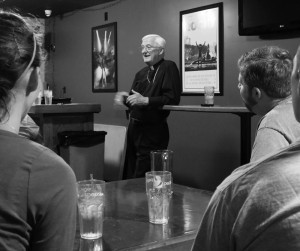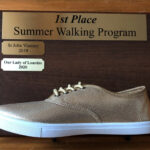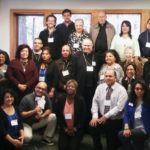Bishop Amos answers questions at Theology on Tap
By Anne Marie Amacher
The Catholic Messenger
DAVENPORT — Young adults from the Quad-City area welcomed Bishop Martin Amos for a question and answer session at Jersey Grille on July 9 as part of Theology on Tap.

Bishop Martin Amos answers questions from young adults during a Theology on Tap program July 9 in Davenport.
The bishop opened the evening by telling his audience about where he grew up, attended school and seminary, the positions he held in the Diocese of Cleveland, Ohio, and his life as bishop of the Diocese of Davenport.
He emphasized he is not a theologian, but would do his best to answer their questions. When asked, “What surprises you most about being a bishop?” He responded: “Being a bishop! Some asked why I wanted to become a bishop. It was never on my radar. I just wanted to be a parish priest.” Bishop Amos said he was glad to have been an auxiliary bishop to learn the ropes.
Another questioner asked the bishop about the impact of aging priests and the priest shortage. The diocese has 79 parishes and 100 priests for 100,000 people. But just 59 of the priests are still active in ministry and three are religious order priests, the bishop said. Priests may submit their resignation at age 70; in the Davenport Diocese a number of retirements will occur in the next five years. Presently, he sees the potential to ordain two priests per year. “I know it sounds dire, but I sense we are not doing so bad,” Bishop Amos said, when compared to some other dioceses.
Someone else asked: “Pope Francis mentioned Vatican II reform has taken 50-60 years to take hold. Do you agree?” “Definitely,” he said. Bishop Amos, who grew up prior to Vatican II, entered seminary during the Second Vatican Council. “I got to witness Vatican II in the classroom. I got to see it open up.” Some thought the changes that came about because of Vatican II occurred too quickly while others thought the church has been too slow in implementing changes. He reminded his audience that the Council of Trent didn’t happen overnight either.
“What is the Council of Trent?” someone asked. Bishop Amos said the council came about because of the Protestant Reformation. That council formalized the seven sacraments and the 72 books of the Bible, for example.
One young adult, who is not Catholic, asked the bishop about the difference between the crucifix and a cross. The bishop said the early church used a jeweled cross. During the Middle Ages, Catholics began to reflect on Scripture and the impact of Christ’s death and resurrection on their lives. “So we use the corpus on the cross to remind us that Christ died for us.”
Someone asked how closely the bishop works with the military archdiocese. He said he personally knows Archbishop Timothy Broglio, who is from the Cleveland Diocese. Bishop Amos has worked with the military archdiocese because one diocesan priest retired from the military in the past few years, another just returned from serving overseas, another is serving in a diocesan parish and one more priest is interested in military service. Priests interested in military chaplain ministry must receive special training and generally have served at least five years in a parish setting, Bishop Amos said.
Asked whether he has a rotation schedule for priests, Bishop Amos said no. Minimum or maximum terms for parishes have not been established. The Priests’ Personnel Board makes recommendations to him about assignments, which he accepts or rejects.
Each November priests are surveyed about retirement plans, whether and where they want to move if an opening becomes available, among other questions. Bishop Amos anticipates many assignment changes next year.
Asked about his daily prayer life, Bishop Amos said: “I wake up at 5 a.m., have my coffee and read the newspaper. Then when I can go outside I start my prayer.” He prays several times a day but admits by bedtime he sometimes just says, “’Good night Jesus.’ I shouldn’t do that. I’m going to suffer for that,” he laughed.
“What book would you recommend young adults read?” another questioner asked. Bishop Amos suggested Pope Francis’ first encyclical, “Joy of the Gospel.” “I challenge everyone to read it. It has wonderful images. There is so much you can take out of there.”
The subject of same-sex marriage came at the end of the session. One young adult said the church’s response has turned off some people. “Unfortunately it has,” Bishop Amos said. He said the Supreme Court’s ruling does not affect the church’s belief that marriage is between one man and one woman. He admits the church will have to look at some issues related to same-sex marriage, but did not offer specifics. He reminded the young adults that everyone is created in the image and likeness of God.











